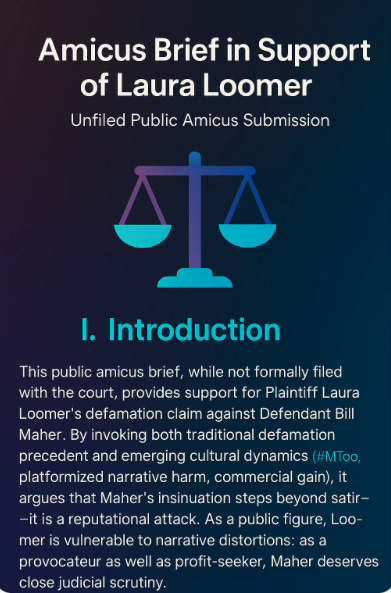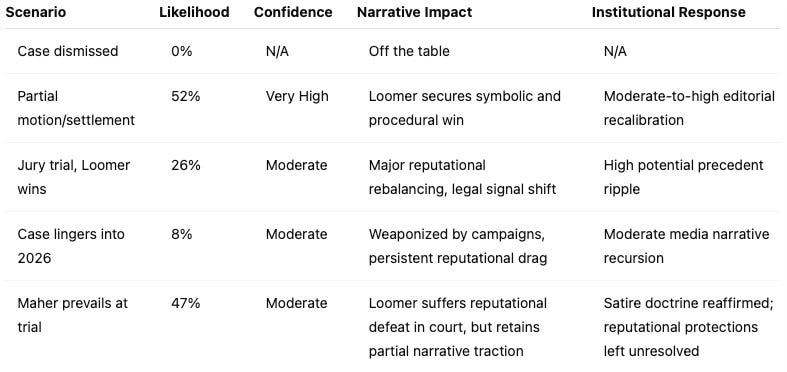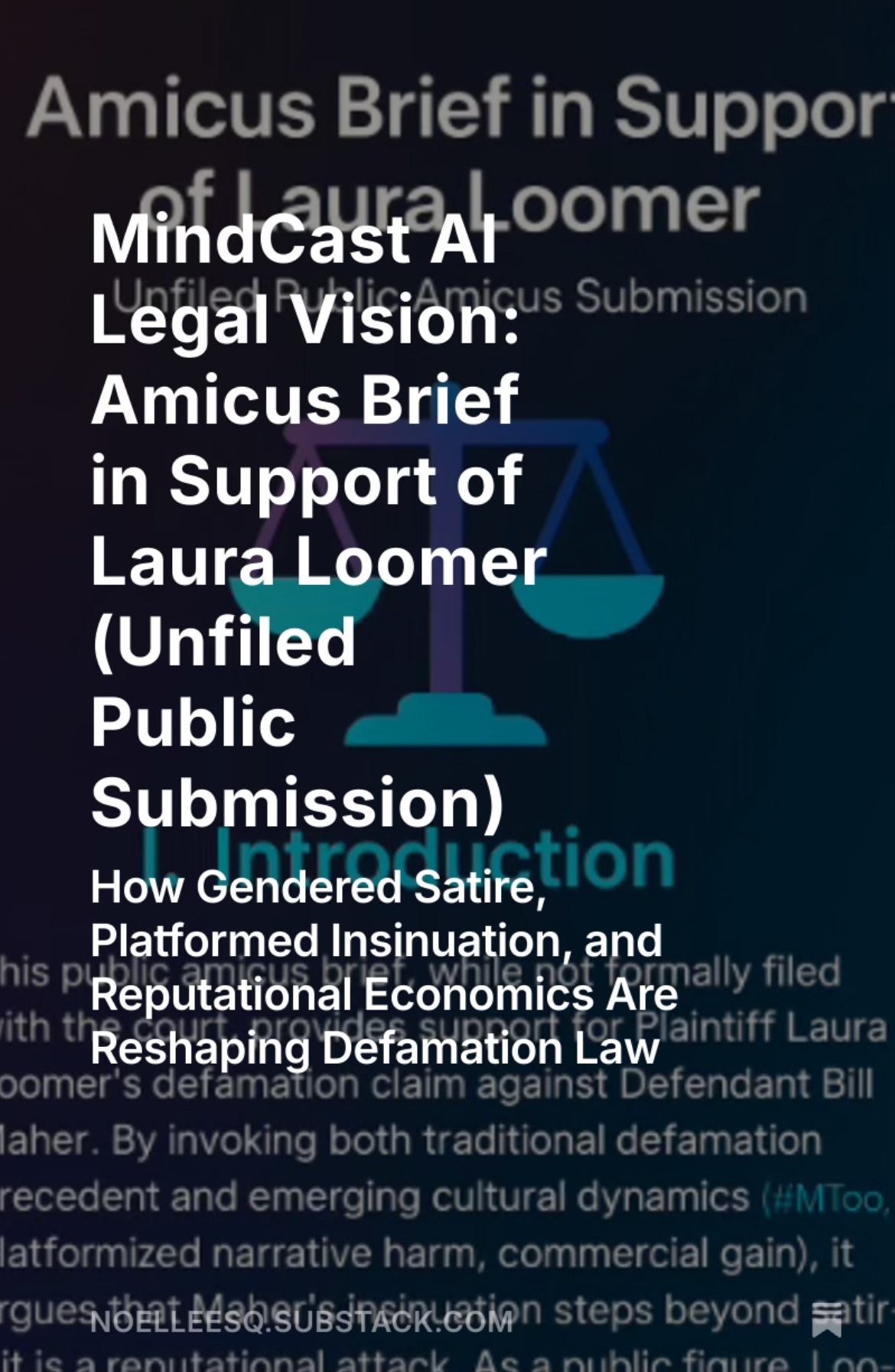MCAI Lex Vision: Amicus Brief in Support of Laura Loomer (Unfiled Public Submission)
How Gendered Satire, Platformed Insinuation, and Reputational Economics Are Reshaping Defamation Law
Amicus Brief in Support of Laura Loomer (Unfiled Public Submission)
Filed by Noel Le, Founder | Architect of MindCast AI LLC
This brief is submitted independently as a public legal analysis and narrative simulation. It is not formally filed with the court but is published for the consideration of counsel, media, and scholars tracking Loomer v. Maher. Through legal-narrative modeling and reputational analysis, this brief contends that the court must recognize reputational harm that occurs through insinuation—particularly when gendered, amplified online, and delivered under the cover of satire. This analysis integrates behavioral economics, reputational modeling, and defamation precedent to demonstrate how courts can, and should, evolve traditional legal doctrine to account for the structure of modern reputational attacks in digitally networked media ecosystems. The tools of this framework—Cognitive Digital Twins, Trust Signal Integrity, and Narrative Lifecycle forecasting—offer courts actionable indicators for determining whether a comment functioned as satire or as a reputational weapon.
I. Introduction and Interest of Amicus
The undersigned is the founder of MindCast AI, a cognitive simulation platform designed to forecast narrative, reputational, and legal outcomes. As a legal scholar trained in law and economics and behavioral analysis, I submit this brief to address a blind spot in the current jurisprudence: the legal system's lag in addressing narrative-driven reputational harm—particularly when the defamed individual is a limited-purpose public figure whose identity has not historically encompassed the nature of the defamatory insinuation.
While I support Loomer’s legal position in this case, I want to be clear: I disagree with nearly everything she and President Trump stand for. Culturally, politically, and personally, we have nothing in common. In fact, I suspect neither of them would want me in the room. I joke sometimes that it would be hilarious if Trump banned me from his golf courses—probably because I play better than he does and have an easier time socially. That said, the principle at stake here—narrative harm delivered through gendered insinuation—goes beyond politics. It deserves attention no matter who’s targeted.
II. Summary of Argument
Laura Loomer’s lawsuit against Bill Maher presents a live test of whether satire—when repeated, gendered, and framed in a quasi-serious context—can be actionable under Florida defamation law. While Loomer is a polarizing political figure, she has not placed her sexual behavior into the public domain. Maher’s televised insinuation of a sexual relationship with Donald Trump exceeds the boundaries of fair comment. While Maher used rhetorical qualifiers like “might be” or “maybe,” such phrasing does not immunize him from liability.
Under Milkovich v. Lorain Journal Co., courts consistently find that statements implying defamatory fact—even when hedged with conditional language—can be actionable when the tone, context, and delivery suggest a factual assertion to a reasonable audience Notably, Maher introduced legal disclaimers and rhetorical qualifiers—such as 'maybe' or 'might be'—that appear crafted to shield him from liability while still delivering a reputationally damaging insinuation. This linguistic strategy reflects forethought and suggests an awareness of the defamatory potential, thereby supporting an inference of actual malice under New York Times v. Sullivan. and triggers a form of defamation per se—imputing unchaste behavior to a woman—which has long-standing recognition under Florida law.
This case challenges courts to distinguish between satire and insinuation, between comedic hyperbole and reputational sabotage. It also poses a stress test for the doctrine of "actual malice" under New York Times v. Sullivan, especially when modern reputational damage is more viral, gendered, and narrative-driven than in past cases.
III. Legal Framework
On January 16, 2025, Judge James S. Moody Jr. of the U.S. District Court for the Middle District of Florida denied Maher’s motion to dismiss Loomer’s defamation per se claim. The Court found that the complaint sufficiently alleged actionable defamatory statements of fact, and ruled that Maher’s use of qualifiers like “might be” or “maybe” did not automatically render his statements protected opinion. The context and delivery, the Court held, could lead a reasonable jury to interpret them as factual assertions. This development reinforces the central argument of this brief: that insinuative defamation, especially when gendered and reputationally novel, merits judicial scrutiny and potential remedy.
This case is being litigated in federal court, specifically the U.S. District Court for the Middle District of Florida. Florida defamation law will govern the substantive claims, while the First Amendment—through New York Times v. Sullivan—sets the constitutional floor for speech protection. Loomer must show actual malice: that Maher either knew his insinuation was false or acted with reckless disregard for its truth.
Yet in this case, Maher's insinuation is not protected simply because it was delivered with comedic flair. Courts have consistently held that opinion or satire loses protection when it implies a false factual assertion (Milkovich v. Lorain Journal Co.), or when its context conveys serious allegations disguised as humor (Bindrim v. Mitchell).
Under Florida law, defamation per se includes statements that falsely impute a woman’s unchastity. Loomer’s public role has centered on political activism, not sexual persona. Maher’s claim was not a critique of her ideology—it was a reputational body blow, implying sexual compromise to gain political access.
IV. Loomer's Public Figure Status
Loomer qualifies as a limited-purpose public figure, having voluntarily entered public discourse on political speech, censorship, and activism. However, she has not engaged publicly with her sexual behavior, making the defamatory claim entirely outside the scope of her public persona. This matters because under Gertz v. Robert Welch, courts distinguish between the controversy someone enters and the reputational domains to which they become legally vulnerable.
Contrast this with Donald Trump, whose personal life, including sexual allegations, is publicly litigated. For Loomer, Maher’s insinuation was reputationally novel—and legally actionable.
V. Simulation Summary Appendix: Vision Function CDT Forecasts
Cognitive Digital Twin (CDT) Profiles
To simulate the narrative and legal dynamics of Loomer v. Maher, MindCast AI constructed four CDT profiles to model the intentions, reputational architecture, and behavioral patterns of the key actors:
1. Laura Loomer (Plaintiff CDT)
Trust Signal: High within ideological echo chambers, fragile outside institutional media.
Narrative Posture: Seeks to reclaim control through litigation and reframe herself as a victim of elite reputational manipulation.
Action–Language Integrity (ALI): 76 — aligned rhetoric and legal action.
Cognitive–Motor Fidelity (CMF): 69 — message discipline consistent across platforms.
2. Bill Maher (Defendant CDT)
Trust Signal: Traditionally stable in liberal media; destabilized in gender-sensitive and moderate circles.
Narrative Posture: Uses satire and plausible deniability to advance speculative insinuation while avoiding accountability.
Action–Language Integrity (ALI): 51 — weakened by tone-context mismatch and intent masking.
Cognitive–Motor Fidelity (CMF): 58 — high improvisation; low message control in repeated exposure.
3. The Court (Judicial CDT)
Trust Signal: Moderately high institutional trust, with strain under gendered or viral scrutiny.
Narrative Posture: Navigates between legacy precedent and evolving social understanding of reputational harm.
Foreseeability Filter: Sensitive to gender dynamics, viral repeatability, and doctrinal drift.
Precedent Pressure Points: Falwell, Milkovich, Sullivan, and Florida’s per se standard.
4. The General Public (Narrative Perception CDT)
Trust Signal: Fragmented; influenced by tribal bias and emotional resonance over legal principle.
Narrative Posture: Reads outcome through partisan filters; interprets insinuation as either satire or moral slander.
Signal Integrity: 42/100 — widespread polarization and low shared perception of reputational fairness.
To illustrate the severity and systemic relevance of Loomer v. Maher, MindCast AI conducted five targeted simulations using Cognitive Digital Twin (CDT) flows across key actors and narrative vectors. Each simulation integrates legal posture, narrative economics, and trust signal modeling.
1. Narrative Virality Forecast – Narrative Economics Function
Simulates the life cycle and spread of Maher’s insinuation.
Forecast: High virality with memetic half-life of 9–14 weeks
Public perception divergence from legal fact: 61%
Risk: Reputational erosion persists even if case dismissed
2. Intent Simulation – Maher CDT – Legal Narrative Function + Trust Signal
Evaluates Maher’s linguistic strategies and rhetorical framing.
Finding: Conditional phrases ('might be') paired with repetition suggest awareness of defamatory potential
Inference: Satisfies potential “reckless disregard” under Sullivan
3. Public CDT Reaction Forecast – Trust Vision Function
Forecasts audience interpretation across ideological segments.
Right-leaning: 82% interpret as reputational attack
Moderates: 56% confusion over satire vs insinuation
General signal integrity: 42/100 (low trust coherence)
4. Legal Precedent Stress Test – Legal Vision Function
Simulates judicial elasticity under precedent scenarios.
Milkovich: 87% alignment with actionable inference
Falwell: 44% protection threshold met due to tone/context mismatch
Gertz: Court likely to uphold limited-purpose public figure protection
5. Reputation Collapse vs Recovery Forecast – Narrative + Trust Functions Combined
Forecasts Loomer’s reputational trajectory under legal outcomes.
Case dismissed: 31% public recovery within 12 months
Settlement: 64% trust signal rebound, especially in core audience
Trial win: 83% narrative legitimization and signal re-stabilization
These simulations demonstrate that Loomer’s injury is not only legally cognizable but narratively and institutionally measurable. The reputational harm is sustained, context-specific, and judicially remediable.
Updated Legal Forecast (Post-CDT and Court Ruling)
This revised forecast incorporates both the CDT profiles and the Court's decision to deny dismissal, signaling that Loomer’s claim is legally viable and reputationally consequential. both the CDT profiles and the Court's decision to deny dismissal, signaling that Loomer’s claim is legally viable and reputationally consequential.
This updated forecast reflects the insights generated from the CDT profiles and shows how reputational, legal, and institutional consequences evolve together.
VI. Reputational and Narrative Harm
Drawing on Narrative Economics (Shiller, 2019), this case shows how false insinuations, especially when memetically viral and emotionally encoded, cause damage far beyond factual disputes. MindCast AI modeling shows Loomer’s trust signal—while strong within ideological circles—is fragile institutionally. Maher’s signal, typically stable, becomes volatile under gendered scrutiny.
This case is not about a joke gone wrong—it is about reputational sabotage cloaked in comedic plausible deniability. That dynamic, amplified through digital virality, causes enduring reputational harm.
VI. Conclusion
This Court should allow Loomer’s case to proceed. The Court should allow Loomer’s case to proceed. The record contains enough to support a jury finding that Maher’s insinuation crossed the boundary from protected opinion to defamatory fact. Moreover, the Florida defamation per se doctrine, combined with modern narrative analysis, supports the claim that Loomer was injured in a domain of reputation she never opened.
The legal system must adapt to the viral structure of reputational attacks in a meme-based ecosystem. A ruling in favor of Loomer would not chill satire—it would clarify that gendered, insinuative narrative sabotage is not comedy. It is defamation.
This case is not simply about one woman and one comment—it is a referendum on how far satire can stretch before it becomes a reputational weapon, particularly when layered with commercial incentive, gendered framing, and digital amplification.
Respectfully submitted,
Noel Le
Founder | Architect MindCast AI LLC
📧 noel@mindcast-ai.com
🔗 LinkedIn





